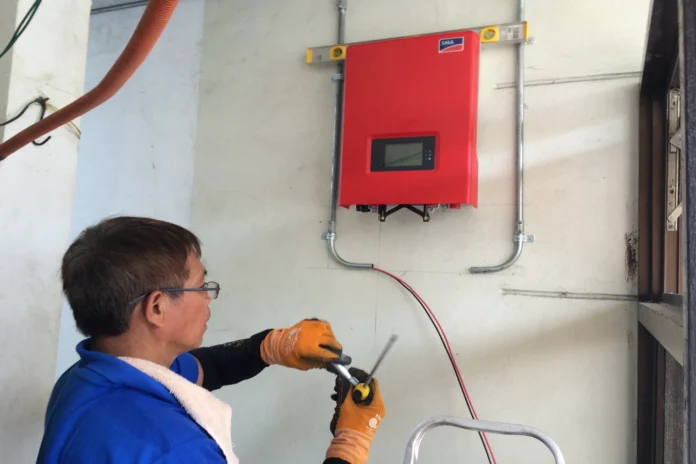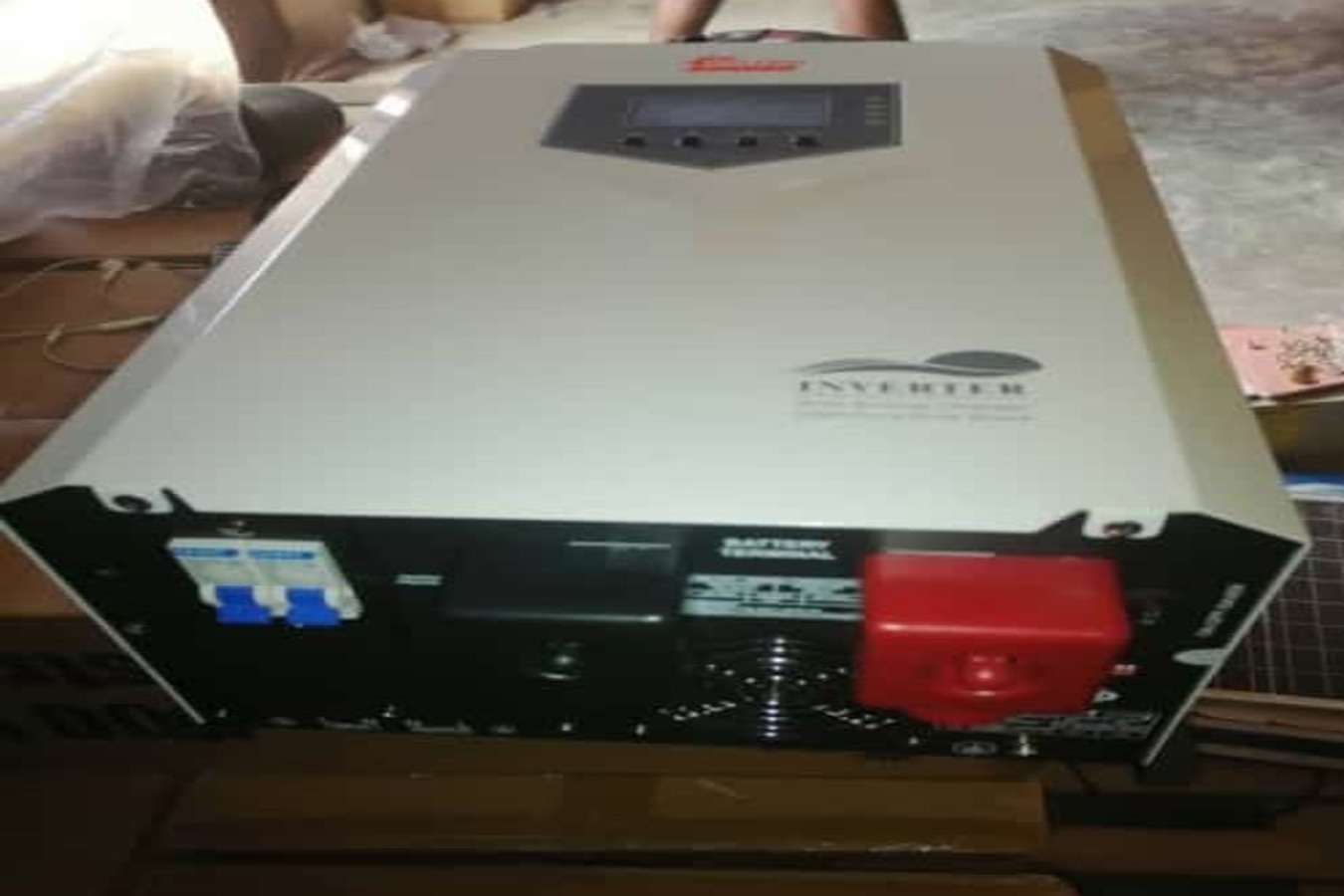Inverter plays a vital role in ensuring that we have a reliable backup power source during blackouts or power outages.
In today’s fast-paced world, an uninterrupted power supply is crucial for both residential and commercial purposes.
However, many people are still unfamiliar with the intricate workings of inverters and their importance in maintaining energy efficiency.
This blog post provides an understanding of inverters, their function, energy conservation benefits, and the selection process for optimal use.
Explore the fascinating world of inverters and discover how they can significantly enhance your power supply and sustainable energy consumption.
What Is An Inverter, And How Does It Work?
In simple terms, an inverter is an electronic device that converts direct current (DC) into alternating current (AC).
It gets the energy from a battery or other DC source. Then, it converts it into the AC power that is required to run household appliances and electronic devices.
The process by which an inverter works is quite fascinating.
The inverter receives DC power from batteries or solar panels and then, converts it into a high-frequency AC power signal.
Thereafter, through the use of electronic components (transformers, capacitors, and semiconductors), the inverter further modifies this AC power signal to produce a stable and smooth sine wave output.
This output is what allows us to power various appliances and devices in our homes.
One of the key features of inverters is their ability to provide power backup during outages.
When connected to a battery, an inverter can store and distribute power whenever the main grid fails.
This capability ensures that crucial appliances like refrigerators, lights, and even medical equipment can continue to function during power cuts.
Moreover, inverters also play a vital role in energy efficiency.
Inverters make it possible for families to use clean and sustainable energy by transforming DC electricity into AC power.
This helps reduce reliance on fossil fuels and lowers carbon emissions, contributing to a greener and more sustainable future.
The Role Of Inverters In Energy Efficiency
In today’s world, energy efficiency has become a crucial factor in our daily lives.
With the increasing demand for electricity, it is essential to find ways to conserve energy and reduce our carbon footprint.
This is where inverters play a significant role.
Inverters are essential devices that convert direct current (DC) power into alternating current (AC) power, making it usable for our electronic devices.
They have become an integral part of our power backup systems and renewable energy sources like solar panels.
One of the key advantages of inverters is their ability to improve energy efficiency.
Traditional electrical appliances often consume more energy when operating on AC power directly from the grid.
In contrast, inverters efficiently regulate the current flow, ensuring minimal energy waste.
By using inverters, you can optimize the energy consumption of your electronic devices.
Inverters have built-in features that allow for power regulation and management, ensuring that only the required amount of energy is delivered.
This helps reduce energy waste and ultimately leads to lower electricity bills.
Moreover, inverters also provide a stable and clean power supply to your appliances, protecting them from voltage fluctuations and power surges.
This not only enhances the lifespan of your devices but also reduces the risk of electrical damage.
Inverters also play a vital role in promoting the use of renewable energy sources.
For instance, inverters transform the DC electricity produced by solar panels into usable AC power for appliances in solar power systems.
Overall, inverters have revolutionized the way we consume and utilize energy.
They not only provide power backup during outages but also contribute to energy efficiency and sustainability.
Factors To Consider In Choosing The Right Inverter For Your Needs
Choosing the right inverter for your needs is crucial to ensuring reliable power backup and optimal energy efficiency.
With the wide range of inverters available on the market, it can be overwhelming to make the right choice.
However, by considering a few key factors, you can narrow down your options and find the perfect inverter for your requirements.
Firstly, assess the power requirements of your appliances and devices that you wish to run during a power outage.
This will help determine the size or capacity of the inverter you need.
It’s essential to choose an inverter that can handle the total wattage of your load without overloading or underutilizing its capacity.
Next, consider the type of inverter that suits your needs. There are three main types: square wave, modified sine wave, and pure sine wave inverters.
Square wave inverters are the most basic and cost-effective, but they may not be suitable for sensitive electronics.
Modified sine wave inverters are more versatile and can power most household appliances.
However, for devices like medical equipment or high-end electronics, a pure sine wave inverter is recommended for its clean and stable power output.
Furthermore, examine the battery requirements of the inverter. Look for an inverter that supports the type and capacity of batteries you have or plan to use.
Also, consider the battery charging time and efficiency of the inverter, as this will impact the overall performance and reliability of your power backup system.
Additionally, check the safety features and protection mechanisms provided by the inverter.
Look for features like overload protection, short-circuit protection, and a low battery alarm to safeguard your appliances.
Lastly, consider the brand reputation and warranty offered by the manufacturer.
Opting for a reliable and trusted brand ensures quality and after-sales support, giving you peace of mind.
The Importance Of Inverters For Power Backup
Inverters act as a bridge between the power source and the load, ensuring a seamless transition during power interruptions.
The importance of inverters for power backup cannot be overstated.
They provide a lifeline during emergencies, allowing us to continue with our daily activities without disruption.
Inverters power essential appliances like refrigerators, air conditioners, medical equipment, and communication devices, ensuring safety and well-being in critical situations.
Moreover, inverters offer a significant advantage in terms of energy efficiency.
With advancements in technology, modern inverters are designed to optimize power consumption, ensuring that the energy generated is utilized efficiently.
This not only helps reduce electricity bills but also contributes to a greener environment by minimizing the wastage of power.
Investing in a high-quality inverter is a wise decision for every household and business.
It provides peace of mind, knowing that you have a reliable backup power source to rely on when needed.
Additionally, it helps achieve energy independence, especially when paired with renewable energy sources such as solar panels.
What Is An Inverter: Pros And Cons
While inverters offer numerous benefits, it is important to understand their pros and cons before making a decision.
Pros
One of the major advantages of inverters is their ability to provide an uninterrupted power supply during power outages.
With an inverter, you can continue to use your essential appliances such as lights, fans, refrigerators, and even computers, ensuring that your daily routine is not disrupted.
This is especially beneficial in areas with frequent power cuts or for individuals who rely on sensitive electronic equipment.
Another significant advantage of inverters is their role in energy efficiency.
By storing excess power during low-demand periods, inverters help reduce energy waste.
This stored power can be utilized during peak hours, allowing you to optimize your electricity consumption and potentially lower your energy bills.
Additionally, inverters that are integrated with solar panels enable the use of renewable energy, further reducing your carbon footprint.
Cons
However, it’s essential to consider the limitations of inverters as well.
One of the main drawbacks is the initial investment cost. Inverters can be expensive, especially when combined with batteries or solar panels.
Additionally, inverters have a limited capacity. The number of appliances that can be powered simultaneously may be restricted.
It’s crucial to assess your power requirements and choose an inverter with an appropriate capacity to meet your needs.
Maintenance is another aspect to consider. Inverters require regular upkeep and battery replacements to ensure optimal performance.
This adds to the overall cost and effort associated with owning an inverter system.
Furthermore, the efficiency of inverters can vary depending on the quality of components used and the brand chosen.
It is advisable to invest in a reliable and reputable brand to ensure long-term performance and durability.
It’s important to weigh the pros and cons based on your specific requirements and budget.
To make an informed decision about incorporating an inverter into your power backup and energy management strategy, conduct thorough research and seek expert advice.
What Is An Inverter: Frequently Asked Questions
In this section, we will address some of the most frequently asked questions about inverters to help unravel the mystery surrounding them.
An inverter works by utilizing electronic components such as transistors, capacitors, and transformers to convert the DC power from batteries or solar panels into AC power. It changes the frequency and voltage of the power supply to match the requirements of the connected devices.
There are three types of inverters: square wave inverters, modified sine wave inverters, and pure sine wave inverters. Square wave inverters are the simplest and least expensive, while pure sine wave inverters produce the cleanest and highest quality AC power.
Yes, inverters can greatly contribute to energy efficiency. Pure sine wave inverters are known for their high energy efficiency and ability to handle a wider range of devices without causing any compatibility issues. They ensure minimal power loss during conversion, resulting in reduced energy consumption.
Inverters are compatible with various battery types, including lead-acid, lithium-ion, and gel batteries. However, it is important to choose an inverter that is specifically designed to work with the battery type you intend to use to ensure optimal performance and longevity.
The size of an inverter is determined by the power requirements of the devices you wish to connect to it. Calculate the total power consumption (wattage) of all the devices and choose an inverter with a higher wattage rating to accommodate any potential power surges.
Final Thoughts On What Is An Inverter?
In conclusion, understanding what an inverter is and how it functions is crucial in today’s world of power backup and energy efficiency.
An inverter is a device that converts direct current (DC) into alternating current (AC).
Hence, it allows you to power up various electrical appliances during power outages or in areas where grid electricity is not readily available.
It acts as a bridge between your power sources, such as batteries or solar panels, and the electrical devices you need to operate.
By harnessing the power of inverters, you not only ensure an uninterrupted power supply but also contribute to energy efficiency.
Inverters play a vital role in optimizing energy usage by converting DC power from renewable sources like solar panels into usable AC power.
This enables you to reduce your dependence on fossil fuels and lower your carbon footprint.
Moreover, inverters have evolved over time to provide additional features such as surge protection, voltage stabilization, and smart monitoring systems.
These advancements enhance the efficiency and safety of your electrical systems while extending the lifespan of your appliances.
Inverters have become an indispensable component of modern power backup and energy management systems.
Are you a homeowner, a company owner, or an eco-conscious individual?
Understanding the foundations of inverters allows you to make educated decisions about your power needs and contribute to a sustainable future,
So, the next time you experience a power outage or contemplate investing in renewable energy, remember the essential role that inverters play in bridging the gap between power sources and your electrical devices.
Embrace the power of inverters, and unlock a world of uninterrupted power supply, energy efficiency, and environmental consciousness.
I hope you found this article helpful. You can also share your thoughts with us by using the reply form below.
Further Readings And References
totalhomesupply: Inverters 101: What is an Inverter and How do They Help?




